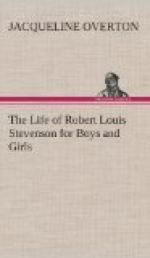“My experience of Stevenson,” writes Mr. Gosse, “during these first years was confined to London upon which he would make sudden piratical descents, staying a few days or weeks and melting into thin air again. He was much at my house, and it must be told that my wife and I, as young married people, had possessed ourselves of a house too large for our slender means immediately to furnish. The one person who thoroughly approved of our great bare absurd drawing room was Louis, who very earnestly dealt with us on the immorality of chairs and tables, and desired us to sit always, as he delighted to sit, upon hassocks on the floor. Nevertheless, as armchairs and settees straggled into existence, he handsomely consented to use them, although never in the usual way, but with his legs thrown sidewise over the arms of them, or the head of a sofa treated as a perch. In particular, a certain shelf with cupboards below, attached to a bookcase, is worn with the person of Stevenson, who would spend half an evening, while passionately discussing some question ... leaping sidewise in a seated posture to the length of this shelf and back again.
“... These were the days when he most frequented the Savile Club, and the lightest and most vivacious part of him there came to the surface. He might spend the morning in work or business, and would then come to the club for luncheon. If he were so fortunate as to find a congenial companion disengaged, or to induce them to throw over their engagements, he would lead him off to the smoking-room, and there spend an afternoon in the highest spirits and the most brilliant and audacious talk.
“He was simply bubbling with quips and jests. I am anxious that his laughter-loving mood should not be forgotten, because later on it was partly, but I think never wholly quenched, by ill health, responsibility and advance of years.
“His private thoughts and prospects must often have been of the gloomiest, but he seems to have borne his unhappiness with a courage as high as he ever afterwards displayed.”
Sidney Colvin he met some time previous while visiting relatives in England, and their friendship was renewed when they met again in London; a friendship which lasted throughout their lives and which even the distance of two seas failed to obliterate. They kept up a lively correspondence and Mr. Colvin aided him with the publication of his writings while he was absent from his own country. After his death, according to Stevenson’s wishes, Mr. Colvin edited a large collection of his letters and in the notes which he added paid his friend many splendid tributes which show him to be a fair critic as well as an ardent admirer. “He had only to speak,” he says, “in order to be recognized in the first minute for a witty and charming gentleman, and within the first five minutes for a master spirit and man of genius.”
Louis’s long absences from home often troubled his mother and caused her to complain when writing. In one answer to her about this time he said:




